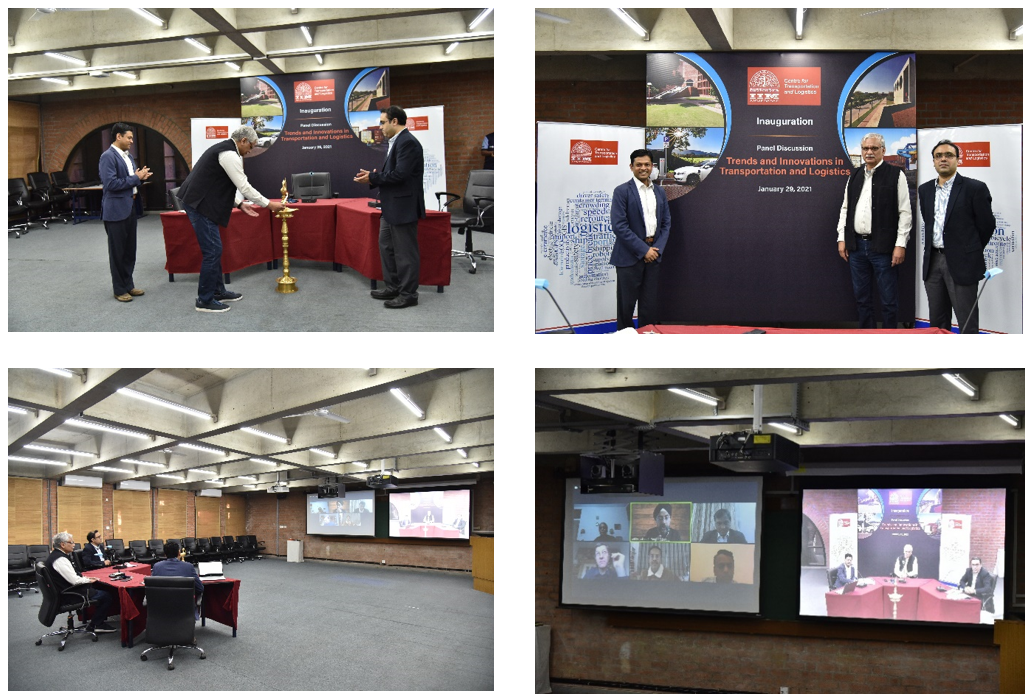The Indian Institute of Management Ahmedabad (IIMA) has a rich legacy in the domains of transportation and logistics. The institute as been contributing to both scholarship and practice in these areas for decades. Academic research from IIMA faculty has been published in high-quality international peer-reviewed journals such as Operations Research, Transportation Science, Transportation Research Parts A, B and E, European Journal of Operational Research, Transport Policy, Land Use Policy, Journal of Transport Geography, etc. IIMA faculty members have written numerous cases highlighting decision-making dilemmas in network design, mode choice, warehousing, infrastructure and transport policy. Relevant postgraduate courses offered in this area include logistics management, innovations in managing urban transport and intelligent transportation systems. IIMA is also fortunate to have illustrious alumni leading and transforming the e-commerce, logistics and urban mobility spaces.
A new Centre for Transportation and Logistics (CTL) was established in September 2020, to strengthen and scale up IIMA's presence and impact in transportation and logistics. The centre's vision is to facilitate cutting-edge research in transportation, logistics and allied areas and thereby contribute to scholarship, practice and policymaking in India and abroad. A group of internationally acclaimed professors with outstanding research accomplishments from North American, European and Asian universities have joined the centre's research advisory committee for guiding centre development and growth.
The timing of the centre establishment coincides with the global transportation and logistics challenges we are witnessing. In March 2021, a large container ship, Ever Given, carrying about 20,000 containers, blocked the Suez Canal due to strong winds. The canal was blocked for six days, which had heavy repercussions on global trade delays. Over 300 vessels were delayed due to this blockage, and alternate modes and routes added to significant freight costs. Similarly, during the COVID-19 pandemic, the transport of essential products such as oxygen tankers from production facilities to hospitals posed myriad challenges. Not only had we witnessed a shortage of oxygen, but the availability of tankers and repositioning them to transport required significant coordination.
Early on during the pandemic, we saw how unplanned mobility restrictions and transport shutdowns caused tremendous hardships across India. The pandemic also created significant concerns regarding the future of sustainable transportation. Specifically, policymakers worry that public transit use and shared travel can decline, and personal vehicle ownership and use can increase as a reaction to this pandemic experience, thereby jeopardising our emission and congestion reduction goals. The pandemic's effect on decarbonisation targets and efforts within the automobile industry and across mobility service providers is also unclear. Therefore, we must find creative ways to reduce the environmental impacts of transportation, develop walking-bicycling infrastructures to promote active travel and outdoor exercise for combating the post-pandemic surge in sedentary-lifestyle-related chronic diseases, and devise pandemic-resilient transportation plans for the future.
We cannot deny that during this pandemic, topics on human mobility, supply chains and logistics management took centre stage of boardroom and household discussions. Currently, the centre plans to engage in solving cutting-edge design and policy-level questions in transportation and logistics.
CTL organised its virtual inauguration event on January 29, 2021. IIMA Director Dr Errol D'Souza inaugurated the event and addressed the participants, stressing the importance of transportation and logistics networks in India's structural transformation, economic growth and social development. Dr D'Souza added that IIMA's tradition is to perform cutting-edge research not only in the management sciences but also for socio-economic development. He indicated that the goal of the centre would not only be to find ways of reducing transportation and logistics operating costs, but also to promote social inclusion and to address environmental sustainability issues.
A panel discussion was organised on the topic "Trends and Innovations in Transportation and Logistics". Distinguished panellists spanning academia, industry and government joined the discussion. The panellists provided useful suggestions on how the centre can address India-specific problems and thereby support India's transportation and logistics ecosystem.
Dr David Cebon, Professor at the University of Cambridge, stressed the need for swappable batteries and charging infrastructure for electrification that can enhance vehicle transportation capacities. Furthermore, he emphasised that the utilisation of multimodal infrastructure could increase India's logistics efficiencies. Mr Abhinay Choudhari, the co-founder of BigBasket.com, echoed how important it is for facilities to be better prepared to handle demand volume fluctuations and manage disruptions in logistics operations. He also highlighted the need for integrated cold chains and multitemperature vans for frozen food transportation. Mr Jalaj Gupta, Business Head at Mahindra Automotive, underscored that the commercial vehicle industry is immensely benefitting from the boom in infrastructure projects and e-commerce. Moreover, he reiteratred that improving customer affordability for vehicle purchase is a key thrust area in the CV industry. Mr Kunal Kumar IAS, Joint Secretary and Smart Cities Mission Director at the MoHUA, GoI, underscored the urgent need for finding ways to promote sustainable transportation in cities, including walking, bicycling, electric mobility, shared transportation, and public transit. He added that innovations in street design and transportation infrastructure financing are critical. Mr Prabhjeet Singh, President of Uber India & South Asia, argued that the shift from private mobility to shared mobility has been remarkable and is irreversible. He added that the pace of electrification in the transportation sector is likely to get accelerated. Professor Geetam Tiwari from IIT Delhi underscored the need for focusing on road safety and the development of walkable environments in Indian cities. She emphasised the importance of prudent transportation and logistics planning to meet sustainable development goals.
CTL plans to organise a series of webinars, workshops and panel discussions periodically throughout the year. The centre will also have rolling opportunities for postdoctoral research and distinguished visiting scholar positions. More details are available on the centre website https://www.iima.ac.in/web/ctl/

Images from the CTL inaugural event held in January, 2021.

Images from the CTL inaugural event held in January, 2021.
About The AuthorS

Prof. Debjit Roy
Prof. Debjit Roy (debjit@iima.ac.in) is a faculty in the Production and Quantitative Methods area
Prof. Sandip Chakrabarti
Ph.D. (2015), Sol Price School of Public Policy, University of Southern California